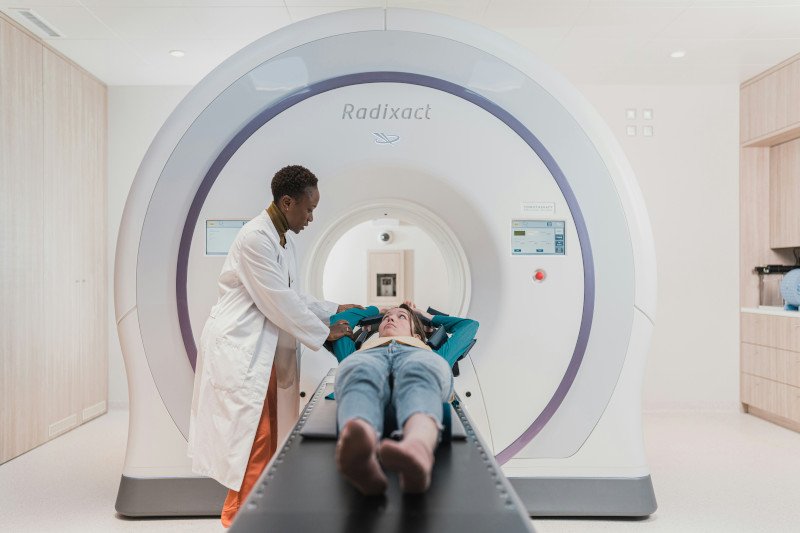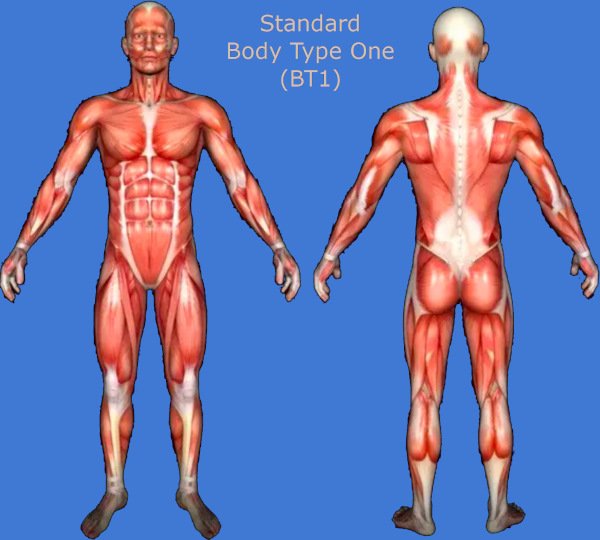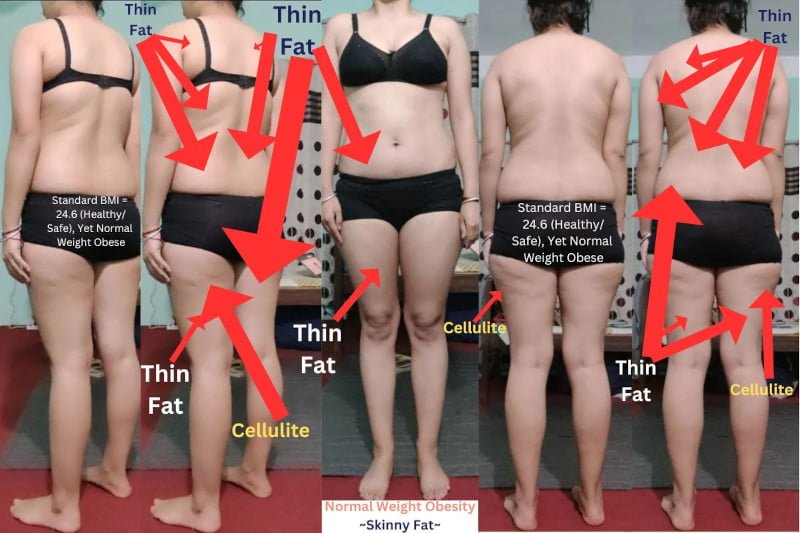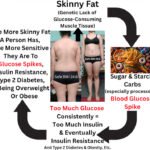The Missing Link in Obesity Research: Genetic Muscle Deficiency (Skinny Fat)

Diet, exercise, and lifestyle directly affect being overweight and obese (too much regular white/yellow body fat). Although the science is very clear that a calorie is not a calorie (1, 2, 3, 4). Food quality matters, no less. What obesity research has lacked to date is the ability to measure and track total muscle tissue — genetic and added via resistance/exercise — including muscle deficiency (skinny fat/lack of genetic muscle (5, 6, 7)).
Why does muscle matter? Muscle significantly affects metabolism (8, 5, 6) — how many calories your unique human body burns at rest, and when active. The more muscle tissue you naturally, genetically have and add via resistance/exercise, the stronger your metabolism and the more calories you burn. The less muscle tissue you genetically, naturally have, the weaker your metabolism and the fewer calories you burn.
Muscle is also a major glucose uptake tissue (9, 5, 6, 8), which substantially influences how each unique body processes blood glucose (sugar) spikes caused by sugar and starch carbs, especially refined via fast, junk, and ultra-processed (UPF) foods. This goes hand-in-hand with insulin resistance (9), type 2 diabetes, and being overweight and obese. It is estimated that roughly 60%+ (10, 11, 12) of the average American diet is fast, junk, and processed food. As the obesity epidemic festers (13, 14, 15, 16).
The Missing Link in Obesity Research: Genetic Muscle Deficiency (Skinny Fat)
With no way currently to measure total muscle tissue, nor any standard average measurement to compare it to, there is no way to accurately know each person’s unique metabolism and how many calories their unique body requires daily. Inaccurate standard BMR and TDEE calculations fall short, at best. Just as no way exists to track muscle atrophy from poor diet, exercise, and lifestyle, or muscle loss due to sarcopenia from natural aging.
 The solution? Developing accurate muscle tissue measurements. Our MRI Study (17) is working on bringing forward the first-ever way to accurately measure total genetic muscle tissue, along with an average muscle tissue measurement relative to height and gender, in which to compare each person’s total genetic muscle measurement. Once our successful MRI Study provides science/medicine with those two vital muscle measurements, doctors, no less, will be able to accurately calculate BMR/TDEE as well as track muscle tissue levels over time.
The solution? Developing accurate muscle tissue measurements. Our MRI Study (17) is working on bringing forward the first-ever way to accurately measure total genetic muscle tissue, along with an average muscle tissue measurement relative to height and gender, in which to compare each person’s total genetic muscle measurement. Once our successful MRI Study provides science/medicine with those two vital muscle measurements, doctors, no less, will be able to accurately calculate BMR/TDEE as well as track muscle tissue levels over time.
Skinny Fat (Lack of Genetic Muscle) and Obesity
 The more skinny fat (lack of genetic muscle tissue)(7, 5, 6) a person is experiencing, the more prone they are to being overweight and obese. People who are experiencing minimal to no skinny fat (AKA Standard Body Type One/BT1 (18, 19, 20)) are the least likely to experience being overweight or obese. Whereas, slight to moderate skinny fat (AKA Body Type Two/BT2 (21, 20)) increases the probability of being overweight and obese. While moderate-high to severe skinny fat (AKA Body Type Three/BT3 (22, 20)) and very severe to extreme skinny fat (AKA Body Type Four/BT4 (23, 20)) greatly increase the probability, respectively.
The more skinny fat (lack of genetic muscle tissue)(7, 5, 6) a person is experiencing, the more prone they are to being overweight and obese. People who are experiencing minimal to no skinny fat (AKA Standard Body Type One/BT1 (18, 19, 20)) are the least likely to experience being overweight or obese. Whereas, slight to moderate skinny fat (AKA Body Type Two/BT2 (21, 20)) increases the probability of being overweight and obese. While moderate-high to severe skinny fat (AKA Body Type Three/BT3 (22, 20)) and very severe to extreme skinny fat (AKA Body Type Four/BT4 (23, 20)) greatly increase the probability, respectively.
Obesity is a serious, complex disease (24, 25, 26, 27). It is associated with many short and long-term negative health effects, including no less than insulin resistance, type 2 diabetes, cancer, heart disease, unnatural attrition of no less than joints, ligaments, & bones, stroke, osteoarthritis, and sleep apnea. If you have the resources to take GLP-1 drugs, they can help with obesity. But they are not the long-term or widespread solution.
Why? Because you have to take those drugs forever, which is simply not cost-effective or sustainable for the average American. At present, drug companies have successfully convinced health insurance companies to pay for GLP-1 drugs. Which means the healthcare companies pass the cost on to health insurance premiums — which means that the average American is paying (28, 29, 30) for GLP-1 drugs, regardless if they are taking them or not. This has caused insurance premiums to skyrocket, with many states seeing outrageous, unaffordable, and unsustainable increases upwards of 175% (30, 28, 29). Again, regardless if you are healthy and do not need GLP-1 drugs.
Genetic Muscle Deficiency (Skinny Fat) – Healthy Diet, Exercise, Lifestyle
Why am I being forced to pay for any American to be undisciplined, lazy, and gluttonous? American health insurance is already a joke; glorified, extremely expensive, basic catastrophic coverage. To add insult to injury, now I am being forced to pay more, get nothing in return, while having to suffer countless Americans not caring about their health, yet forcing everyone else to care about it for them.
Wrangling obesity starts with choosing and following healthy diet, exercise, and lifestyle routines. The more skinny fat you are experiencing, the more diligent you will have to be throughout your life steadfastly adhering to a healthy diet, exercise, and lifestyle.
We developed the Scientific Health Quizzes using the latest science to help you understand your unique genetic body composition (particularly skinny fat), metabolism, diet, exercise, and lifestyle. Free options are available. Accounts are free, anonymous, secure, and private.
References
- Healthline: 6 Reasons Why a Calorie Is Not a Calorie, June 29, 2023, Kris Gunnars, BSc. https://www.healthline.com/nutrition/6-reasons-why-a-calorie-is-not-a-calorie#:~:text=Protein%20contains%204%20calories%20per,Makes%20You%20Eat%20Fewer%20Calories
- NIH, National Library of Medicine: “A calorie is a calorie” violates the second law of thermodynamics, July 28, 2002, Richard D Feinman and Eugene J Fine. https://pmc.ncbi.nlm.nih.gov/articles/PMC506782/
- Harvard Health Publishing: There’s no sugar-coating it: All calories are not created equal, November 4, 2016, Celia Smoak Spell, Assistant Editor. https://www.health.harvard.edu/blog/theres-no-sugar-coating-it-all-calories-are-not-created-equal-2016110410602
- The Conversation: Not all calories are equal – a dietitian explains the different ways the kinds of foods you eat matter to your body, December 22, 2021, Terezie Tolar-Peterson, Associate Professor of Food Science, Nutrition & Health Promotion, Mississippi State University. https://theconversation.com/not-all-calories-are-equal-a-dietitian-explains-the-different-ways-the-kinds-of-foods-you-eat-matter-to-your-body-156900
- Skinny Fat Science: Is Muscle/Mass Genetic and How Does It Affect Skinny Fat?, November 20, 2024. https://skinnyfat.fellowone.com/skinny-fat-science/is-muscle-mass-genetic-and-how-does-it-affect-skinny-fat/
- Skinny Fat Science: Is Skinny Fat Genetic?, November 27, 2024. https://skinnyfat.fellowone.com/skinny-fat-science/is-skinny-fat-genetic/
- Skinny Fat Science: What Is Skinny Fat?, July 26, 2024. https://skinnyfat.fellowone.com/skinny-fat-science/what-is-skinny-fat/
- Skinny Fat Science: How Skinny Fat Affects Metabolism, August 7, 2024. https://skinnyfat.fellowone.com/skinny-fat-science/how-skinny-fat-affects-metabolism/
- Skinny Fat Science: Skinny Fat & Insulin Resistance, July 4, 2025. https://skinnyfat.fellowone.com/skinny-fat-science/skinny-fat-insulin-resistance/
- Stanford Medicine: Ultra-processed food: Five things to know, July 2025, John Sanford. https://med.stanford.edu/news/insights/2025/07/ultra-processed-food–five-things-to-know.html
- U.S. Centers for Disease Control and Prevention (CDC); Changes in Serving Size, Calories, and Sodium Content in Processed Foods From 2009 to 2015, March 15, 2018, Volume 15, Jenifer E. Clapp, MPA, Sarah A. Niederman, MPH, Elizabeth Leonard, MPH, and Christine J. Curtis, MBA.1https://www.cdc.gov/pcd/issues/2018/17_0265.htm
- Johns Hopkins, Bloomberg School of Public Health: Ultraprocessed Foods Account for More than Half of Calories Consumed at Home, December 10, 2024. https://publichealth.jhu.edu/2024/ultraprocessed-foods-account-for-more-than-half-of-calories-consumed-at-home
- American Society for Metabolic and Bariatric Surgery: 2025 Fact Sheet — Obesity in America. https://asmbs.org/wp-content/uploads/2025/06/ObesityDisease2025.pdf
- World Obesity Federation: World Obesity Atlas 2025 – The majority of countries in the world do not have sufficient plans and policies in place to deal with rising obesity levels, researchers at the World Obesity Federation have warned. https://www.worldobesity.org/resources/resource-library/world-obesity-atlas-2025
- The Harvard Gazette: Researchers report ‘astounding’ obesity surge in U.S., October 15, 2025, Mass General Brigham Communications. https://news.harvard.edu/gazette/story/2025/10/researchers-report-astounding-obesity-surge-in-u-s/
- Forbes – Health: Obesity Statistics and Facts In 2025, October 16, 2025, Emily Phares (Fact checked by Nicole Gregory). https://www.forbes.com/health/weight-loss/obesity-statistics/
- Skinny Fat Science: Scientific Skinny Fat MRI Study – Proving What Skinny Fat Is, March 26, 2025. https://skinnyfat.fellowone.com/skinny-fat-science/scientific-skinny-fat-mri-study-proving-what-skinny-fat-is/
- Britannica: human muscle system, Shane W. Cummings and Robin Huw Crompton (Fact-checked by the Editors of Encyclopaedia Britannica. https://www.britannica.com/science/human-muscle-system
- Fellow One Research: Body Type One (BT1). https://www.fellowone.com/category/fellow-one-research/the-four-body-types/body-type-science/body-type-quiz/research-data/body-type-one-bt1/
- Fellow One Research: The Four Body Types. https://www.fellowone.com/fellow-one-research/the-four-body-types/
- Fellow One Research: Body Type Two (BT2). https://www.fellowone.com/category/fellow-one-research/the-four-body-types/body-type-science/body-type-quiz/research-data/body-type-two-bt2/
- Fellow One Research: Body Type Three (BT3). https://fellowone.com/category/fellow-one-research/the-four-body-types/research-participants/body-type-three-bt3/
- Fellow One Research: Body Type Four (BT4). https://www.fellowone.com/category/fellow-one-research/the-four-body-types/body-type-science/body-type-quiz/research-data/body-type-four-bt4/
- Mayo Clinic: Obesity. July 22, 2023. https://www.mayoclinic.org/diseases-conditions/obesity/symptoms-causes/syc-20375742
- Wrld Health Organization (WHO): Obesity and overweight, May 7, 2025. https://www.who.int/news-room/fact-sheets/detail/obesity-and-overweight
- NIH, National Library of Medicine: Is Obesity A Disease or A Behavior Abnormality? Did the AMA Get It Right?, March-April 2014, Howard Rosen. https://pmc.ncbi.nlm.nih.gov/articles/PMC6179496/
- Cleveland Clinic: Obesity, September 10, 2024. https://my.clevelandclinic.org/health/diseases/11209-weight-control-and-obesity
- Forbes: Ozempic Is Raising Your Health Premiums Even If You’re Not Taking It, August 15, 2024, Bruce Japsen. https://www.forbes.com/sites/brucejapsen/2024/08/15/ozempic-is-raising-your-health-premiums-even-if-youre-not-taking-it/
- PBS: Why millions of Americans are facing a spike in health care costs, October 22, 2025, Amna Nawaz and Karina Cuevas. https://www.pbs.org/newshour/show/why-millions-of-americans-are-facing-a-spike-in-health-care-costs
- Politico: Obamacare sticker shock is more shocking in some states than others, October 31, 2025, Robert King. https://www.politico.com/news/2025/10/31/obamacare-sticker-shock-premium-hikes-00630754













